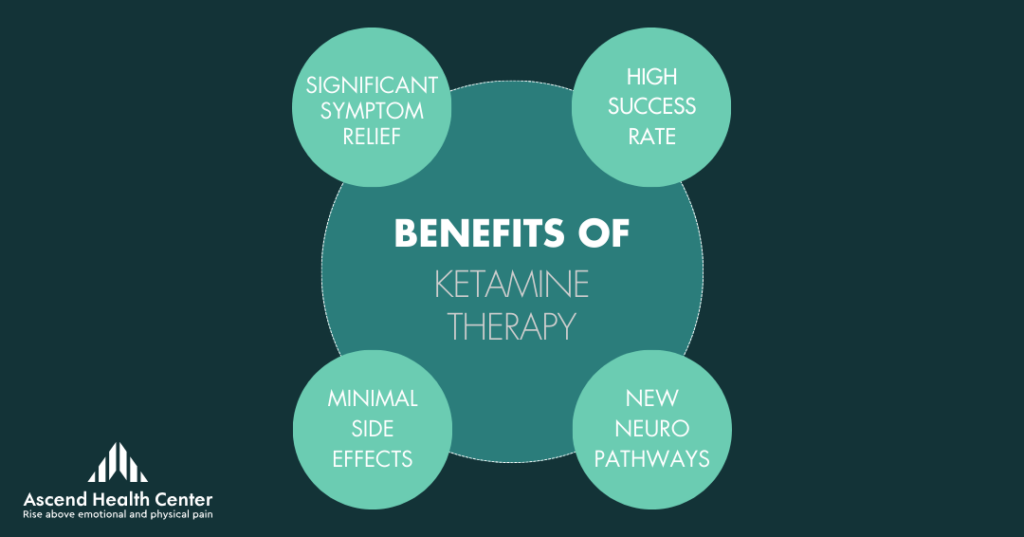Ketamine Infusion Therapy, initially developed as an anesthetic, has evolved into a groundbreaking treatment for conditions such as treatment-resistant depression, PTSD, and anxiety. Ketamine therapy, often combined with counseling, offers hope for individuals who have not found relief through traditional treatments, demonstrating rapid improvements in mood and pain management.
Table of Contents
- History and Evolution of Ketamine: From Human Anesthetic to Ketamine Therapy Infusions for Treatment-Resistant Depression
- What Is Ketamine Therapy? How Do Ketamine Therapy Infusions Treat Depressive Disorder, PTSD, and Anxiety?
- Benefits of Ketamine Therapy Infusions
- The Treatment Process: What To Expect During a Ketamine Infusion Session at Ascend Health Center
- Who Are Good Candidates for Ketamine Therapy Infusions?
- Schedule a Consultation Appointment for Ketamine Therapy Infusions Today
History and Evolution of Ketamine: From Human Anesthetic to Ketamine Therapy Infusions for Treatment-Resistant Depression
Ketamine, originally coded “CI-581,” was developed by modifying a drug known to cause delirium, phencyclidine. Its safety in early trials led to FDA approval in 1970 as “Ketalar,” mainly for anesthesia during surgeries.
In the 1990s, Yale Medical School researchers discovered ketamine’s effectiveness in treating depression and anxiety. They found that ketamine injections could significantly reduce depression symptoms in many patients within a day, broadening its use beyond anesthesia.
In 2019, the FDA approved esketamine, a ketamine-based nasal spray, for severe depression that resists other treatments. This approval required its use with other antidepressants, emphasizing its role as part of a broader treatment plan rather than a sole solution.
Today, ketamine is classified as a Schedule III controlled substance, indicating it has both medical uses and the potential for abuse. This category, which includes drugs like steroids and pain medications, reflects the need to balance ketamine’s benefits against the risks of misuse.
What Is Ketamine Therapy? How Do Ketamine Therapy Infusions Treat Depressive Disorder, PTSD, and Anxiety?
Recent studies at Massachusetts General Hospital have shown that ketamine impacts three key areas of the brain: the prefrontal cortex (PFC), the posteromedial cortex (PMC), and the hippocampus. The PFC is involved in planning and impulse control, the PMC is linked to ketamine’s unique effects on perception and emotional detachment, and the hippocampus is crucial for memory formation. This is significant for treating depression, anxiety, and PTSD because ketamine disrupts usual brain cell communication, promoting the growth of new proteins that enhance brain connectivity, especially in the hippocampus. This action helps relieve symptoms of treatment-resistant depression more quickly than traditional antidepressants.
Ketamine’s effect is partly explained by the disinhibition theory, which suggests ketamine releases growth factors like IGF-1, VEGF, and BDNF. These chemicals aid in repairing brain structures affected by chronic anxiety and depression, something conventional antidepressants can’t do. Beyond its mental health benefits, ketamine might also offer relief for conditions involving nerve inflammation and pain, providing a versatile alternative treatment option.
Benefits of Ketamine Therapy Infusions

Ketamine therapy should always be combined with counseling to enhance ketamine’s holistic effects on mental health conditions. Ensuring changes in the brain are long-term and stabilized further depends on making behavioral modifications instead of solely relying on adjusting neurotransmitter levels.
The success of ketamine treatment for depression involves collaboration between medical staff and therapists, comprehensive patient education regarding misconceptions and stigma about ketamine, and informing patients of both the potential benefits and limitations of ketamine therapy.
Chronic Pain Management
Ketamine may help reduce the severity of different types of chronic pain, especially pain attributed to nerve-related problems or some forms of cancer. It works by calming hypersensitive nerves, relieving inflammation, and interfering with pain signals sent to the brain from the nervous system.
A meta-analysis of studies involving ketamine infusions for various chronic pain conditions found that ketamine infusions significantly reduced pain scores in some cases. Studies showed a notable decrease in pain scores when comparing ketamine with a placebo. Participants with nociplastic pain syndromes like fibromyalgia and complex regional pain syndrome also reported lower pain scores when treated with ketamine therapy infusions.
Lifts Depression Quickly
Research indicates that for some people, ketamine may improve signs of depression in two to three hours. Oral antidepressants can take as long as two to four weeks to start working. Positron emission tomography (PET) scans show that individuals experiencing bipolar depression had metabolic changes in an area of the cortex that doctors think may explain ketamine’s ability to act like an antidepressant. A review of other ketamine therapy studies suggested that not only could ketamine be an effective treatment for depression, but that it could reduce suicidal ideation without causing long-term side effects.
Treatment-Resistant Anxiety (Refractory Anxiety)
When generalized anxiety does not respond to standard therapies and medications, psychiatrists refer to this as “refractory anxiety.” Persistent stress can impair the functioning of the prefrontal cortex, hippocampus, and other parts of the brain and lead to mood disorders and cognitive issues. Studies show that blocking NMDA receptors with particular drugs improves the functioning of the hippocampus and PFC. Ketamine blocks these receptors and increases a chemical called glutamate that activates other receptors vital to supporting brain growth and change.
Ketamine and PTSD
Recent studies have investigated the effects of ketamine therapy infusions on patients with PTSD and treatment-resistant depression. Veterans receiving ketamine infusions for two weeks experienced 41 days of improved symptoms before signs of PTSD began returning. Some animal studies indicate that ketamine may work to decrease the consolidation of PTSD memories that contribute to flashbacks, nightmares, and hypersensitivity to stimuli. In other words, ketamine infusion therapy helps alter the brain’s processing of trauma by providing a safe space for memories to be reorganized and stored in a more manageable way.
The Treatment Process: What To Expect During a Ketamine Infusion Session at Ascend Health Center
As an Ascend Health Center patient, we want you to know that your well-being and comfort are our top priorities. Our treatment center provides a serene and inviting atmosphere that will help you feel relaxed and in compassionate hands. Under the guidance of a skilled physician, ketamine treatment for depression and other mental health conditions is administered intravenously in small doses. Throughout the one to several hours required for a ketamine infusion, you’ll relax in a comfortable reclining chair, with doctors and staff readily available for assistance.

Ketamine therapy patients typically report feeling calm and tranquil soon after the infusion treatment begins. You may experience quick relief from depression symptoms and unwanted thoughts that contribute to your depression and anxiety. While the effects may vary in duration, they are generally most noticeable immediately following the infusion and can last for weeks or months. Most patients undergo six to ten infusions spread out over several weeks to maximize ketamine’s therapeutic benefits.
Who Are Good Candidates for Ketamine Therapy Infusions?
Not everyone is a good candidate for IV ketamine therapy. Individuals who may not be candidates include adults with:
- An active substance abuse disorder
- A history of psychosis and psychotic episodes
- Having health issues involving increased intracranial pressure
- A positive pregnancy test
- Uncontrolled or severe hypertension
- Cardiovascular disease
Possible side effects of ketamine are temporary and subside soon after treatment. The most common side effects are increased heart rate, dizziness, nausea, and a sense of emotional detachment. During your consultation appointment at Ascend Health Center, your doctor will explain the procedure in detail, including how ketamine works and its potential benefits and risks. Your doctor will also address any questions or concerns and ensure you feel relaxed and comfortable before proceeding with the treatment plan.
Schedule a Consultation Appointment for Ketamine Therapy Infusions Today
Ketamine may be the solution you have been searching for to get relief from treatment-resistant depression, anxiety, PTSD, or chronic pain conditions. Don’t hesitate to call Ascend Health Center now to speak to one of our compassionate staff members about how ketamine therapy may be right for you.
